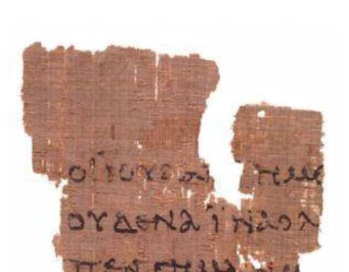Guides for Singing, Not Distractions (Part Four - New Testament Commands)
Musical Instruments in the Public Worship of God
John Ryland’s Library Papyrus P52 is the earliest New Testament manuscript archaeologists have discovered.
The following post is part of an edited version of a paper I presented for Professor Aaron Garriott’s Communication class. While books of great length could be (and have been) written on this subject, this series of blog posts is intended to be a basic introduction to the subject that answers several common objections.
This blog series is in five parts: Introduction, Early Church Practice, Types and Shadows, New Testament Commands, and Conclusion.
New Testament Commands
The third and final objection is that musical instruments are not explicitly commanded in the New Testament and have therefore been forbidden. At a United Presbyterian convention in 1883, Reverend William Wishart wrote: “The New Testament is totally silent with respect to the use of instrumental music in the worship of God. Not a solitary text can be found to afford the least authority for it either by way of precept or example—in express words or by legitimate inference.”1 While this debate appears to be an argument from silence on both sides, we can gain further insights into the issue by looking at Paul’s commands in Ephesians 5:19 and Colossians 3:16.
In both Colossians and Ephesians, Paul commands us to sing “psalms and hymns and spiritual songs.” Without getting into what kind of lyrical songs these each refers to, it is helpful to get a basic definition of each word and its implications for our singing.
…Paul in Ephesians is saying “speaking to yourselves in psalmos and hymns and spiritual songs, adō and psallo in/with your hearts to the Lord.” The preposition before psalmos can be translated “in” or “with.” This music is not necessarily silent (as in “humming to oneself”), but could mean “with one’s whole being.” Since psallō is related to a word for playing a plucked, string instrument (like a harp) and since Paul chooses to use both adō and psallō, one could infer that both voices and instruments find support here.2
The implication from the relation of these two Greek words is that one may accompany their singing in public worship with musical instruments. Since the word has a general meaning applying primarily to vocal but also to instrumental music, this gives the further implication that instrumental accompaniment is not required, but permitted.
Some object that by drawing an implication from a command, we are violating the regulative principle of worship. While we are forbidden from worshipping in manners which God has not commanded, there are three different categories for parts of the worship service: elements, forms, and circumstances. Elements are the core aspects of worship, forms are the ways in which these are expressed, and circumstances are the settings in which they are practiced. While every element of our worship services must be expressly commanded by God, forms and circumstances are affected more by the individual culture or congregation. In this case, singing is the element (which must be practiced), instrumental or a cappella singing is the form (which is not universal), and the setting of the gathering is the circumstance (which could be anywhere, indoors or outdoors).3
Thank you for reading part four of "Guides for Singing, Not Distractions." Be on the lookout for the final part tomorrow.
William Wishart, “Summary of Arguments Against Instrumental Music in the Testament Worship,” in Proceedings of the Convention of United Presbyterians Opposed to Instrumental Music in the Worship of God Held in the Fourth U.P. Church, Allegheny, PA. August 14th & 15th, 1883 (Pittsburgh: Myers, Shinkle & co., 1883), 150.
Paul S. Jones, “Hymnody in a Post-Hymnody World,” in Give Praise to God: A Vision for Reforming Worship, ed. Philip Graham Ryken, Derek W. H. Thomas, and J. Ligon Duncan III (Phillipsburg, NJ: P&R Publishing, 2011), 465n3.
The argument could also be made that instrumental or a cappella singing is the circumstance of worship. Regardless, the point remains the same: they are not the element, and there is therefore more freedom in how they are practiced.



